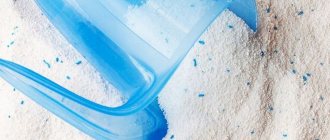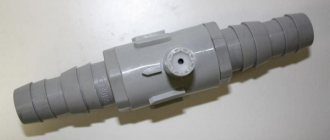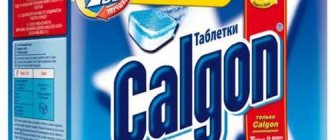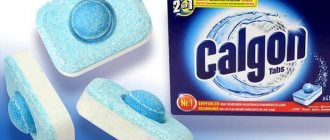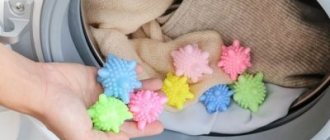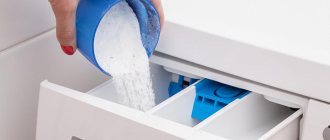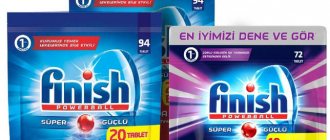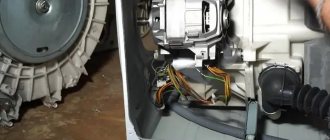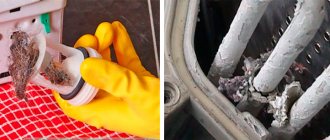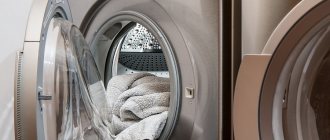With the advent of washing machines and the deterioration of water quality in city water supplies, the question arose: How to ensure the safety of equipment without spoiling clothes and linen during washing?
Safe chemistry is not a myth. Of course, everything that is safe is relatively dangerous. No one should ignore the usual precautions when using special equipment care products.
It is very important to know how to use calgon in a washing machine in order to get the desired effect and, moreover, not to damage the machine itself or spoil the laundry and clothes.
Chemical components of Calgon
Calgon refers to aggressive chemicals, which are a set of reactive acids and astringent polymers, as well as aromatic additives and polyphosphates that bind calcium and magnesium ions.
It is calcium and magnesium that form that hard plaque and scale in the drum of a washing machine, on the heating element and other electromechanical parts of washing machines due to the action of highly chlorinated water during water supply filtration.
Compound
- about 30-35% of Calgon are polycarboxylates - a set of aggressive acids;
- from 10 to 15 percent of polyethylene glycol - a substance that binds magnesium and calcium ions (plaque and scale);
- sodium orthophosphate or polyphosphate is also a binder to prevent scale and plaque;
- about 20% cellulose;
- technical soda;
- fragrances, deodorants, odor removers.
Important note! Calgon cannot influence the deposits and scale already existing in the washing machine.
To remove contaminants, completely different means are required.
Kalgon itself is intended to prevent the appearance of scale and plaque, as a strong prophylactic agent.
pros
"Kalgon" helps to achieve not only the removal of scale, but also has a number of advantages over its analogues:
- if you add the powder together with the main detergent, the consumption will be more economical;
- in soft water, the removal of contaminants from fabric fibers is faster and therefore more effective;
- the service life of household appliances increases, there are no unexpected expenses for repairs;
- When washed, products do not lose color saturation, since there is no longer a gray deposit of scale.
The shape of the tablets allows you to use the product in doses (no need to measure anything). It is also easier to store compressed powder; there is no risk of inhaling particles, they will not remain in the air.
Are you unplugging your washing machine?
Oh yes! No
Application of Calgon
Efficiency of using Calgon for washing machines
Research by some chemists suggests that Calgon is not effective as a prophylactic for washing machines.
However, the actual composition of this reagent is very powerful and, as an oxidizing agent, it actually softens highly chlorinated water at water supply stations.
Nevertheless, Calgon still enjoys considerable popularity and this is not a consequence of widespread advertising, but the result of its active and effective use.
Mode of application
Calgon is used only and exclusively for washing machines.
The consequences of using this product for other household and kitchen appliances have not been studied, so refrain from experimenting.
The dosage of Calgon for washing machines depends on the hardness and chlorination of the home water supply.
How to determine the hardness of your water
It is not difficult to determine the hardness of home water and the presence of large amounts of chlorine, calcium and magnesium in it. Just take a piece of laundry soap and crumble it into a glass of cold water.
If the soap crumbs do not dissolve after half an hour, then the water is extremely hard and saturated with magnesium and calcium, which will cause scale when washing in a machine without Calgon.
Proportions of use
If you use powdered Calgon, then according to the degree of hardness you should use 1/3, 2/3 or a whole measuring cup of emollient.
Powder Calgon is poured into one compartment along with washing powder.
A Calgon tablet is added directly to the drum of the washing machine, which must be loaded along with the laundry and clothes.
Is the product really that effective?
Studies have been repeatedly conducted where, as a result, Calgon was exposed as an ineffective remedy. Some experts say that in terms of its constituent components the substance is an ordinary washing powder. the latter, by the way, also softens the water. Others were unhappy that the product was only for prevention and did not help with already accumulated plaque.
There are a lot of both positive and negative reviews about Calgon. Therefore, opinions vary greatly. But, if you have scale in your washing machine, you can quickly remove it using folk remedies. For example, vinegar or baking soda.
Therefore, one can judge the usefulness/uselessness of Calgon only after using it. But, nevertheless, we will give several reviews from housewives who used this substance during washing.
Possible release forms
All types of Calgon produced are very convenient to use. However, they are used differently depending on the form.
Exists:
economical powder Calgon - for adding to the tray along with washing powder;- Calgon tablets - for particularly hard water and added directly to the drum of the washing machine;
- gel form - perfect for both very hard water and softer water.
Packaging
- Powder packages are produced in packs weighing 0.55 kg, 1 kg, 1.6 kg.
- Tablets are packaged in quantities of 12, 15, 32, 35, 40 and 70 tablets per pack.
- The gel is bottled in plastic bottles of 0.75, 1.5 and 2 liters.
Tips for housewives
Here are some tips about Calgon powder. Ingredients: sodium tripolyphosphate (photo below), polyethylene glycol, cellulose and other substances. They will take the best care of all the internal parts of the car. Add Calgon with every wash. Clean it additionally with citric acid (once a year). Alternate washing powders. Take care of your assistant.
The salt included in Calgon (composition) is sodium tripolyphosphate and is a food stabilizer. This salt interacts with substances such as polyethylene glycol and polycarboxylates, breaks down and acts on limescale. Those, in turn, soften and, under the influence of acids, are separated from the machine parts. This way, your equipment will be in excellent condition, and you won’t have to worry about its condition or wait for it to break.
Existing Calgon substitutes or alternative
Of course, Calgon is not a panacea for protecting your washing machine from plaque, scale and dirt. There are other, cheaper analogues. Perhaps they are less effective, it is possible that they are less advertised, but they exist.
Here are their examples:
- Alphagon,
- Antiscale,
- Lemon acid.
Both the first and second are quite capable of coping with the problems of contamination of the heating element of the washing machine and drum. But the real effect of these alternative remedies has been studied and tested much less than Calgon.
You can also use simple citric acid to clean the drum and heater by pouring it into the liquid compartment.
Naturally, nothing can be washed with citric acid - only clean it in idle mode. But citric acid can easily clean plaque and moderate scale.
What does the drug combat?
The main purpose of the product is to combat the formation of scale on the heating elements of an automatic washing machine.
It is a solid deposit, the appearance of which is associated with an increased content of hardness salts in the water.
They are based on carbonic acid salts (calcium and magnesium carbonates).
When moving in underground aquifers, water partially dissolves the minerals contained in rocks, becoming enriched with these compounds.
When water is taken from natural sources , it enters the water supply system, in which filters must be installed to purify the water (for washing machines).
The problem is that when water is heated, these salts decompose to form water-insoluble substances.
They precipitate, creating the well-known limescale deposit on the walls of vessels and heating devices - scale.
What do you know about water hammer? What unpleasant consequences it can lead to and what destructive power it has for the water supply is written in a useful article.
At what temperature do heating batteries freeze in the winter, find out on this page.
What problems does scale cause?
The formation of scale in a washing machine creates the following problems:
- Sediment appears on the walls of pipelines, their effective cross section decreases.
This increases the load on the pumping equipment, in particular, the outlet valve of the drain pump of washing machines (what to do if the water does not drain).In addition, these deposits become a center for the deposition of contaminants, which further reduces the internal cross-section of the pipe (drain hose).
In places of turns and bends, plugs form, completely blocking the flow of water.
- Porous structure and physical characteristics of substances, forming scale, give the layers of sediment the properties of a heat insulator.
As a result, water heating deteriorates and energy consumption increases.In washing machines (how to properly connect the drain hose is described here) it takes more time to heat the water, and energy consumption also increases.
Note to car owners! A layer of scale 1 mm thick increases energy consumption by 10%, but if the layer is allowed to grow to 3 mm, energy consumption during the washing process will increase by a quarter.
In addition, the thermal insulating properties of scale contribute to internal overheating of heating elements (helix coils) and their failure.
- Scale is dangerous for rubber insulators and seals , as it reduces their elasticity.
This leads to the appearance of ruptures under loads and the formation of cracks in the structure, which is fraught with loss of insulating and sealing qualities. - The appearance of a layer of scale promotes the accelerated development of corrosion processes underneath due to a local increase in surface temperature.
Important! The failure of a washing machine due to scale formation is considered by many service centers to be a non-warranty case!
In this case, you can’t count on free repairs!
Scale is not the only problem that high water hardness creates.
Hardness salts react with surfactants used in washing (they are included in most washing powders), forming insoluble compounds.
Do you know which instantaneous electric water heater for shower to buy? Read this useful article for recommendations on choosing household and plumbing fixtures.
These deposits are deposited not only on the parts of the washing machine, but also on the laundry.
As a result, a grayish coating changes the color of things , the fabric becomes stiffer, and its internal structure is destroyed.
In water rich in hardness salts, more detergents will be required to remove contaminants.
The manufacturer positions Calgon as a water softener that can combat these problems.
This is interesting: How to clean a dishwasher at home
How does Calgon work?
Calgon breaks down scale with its active substances.
If the layer of plaque in the drum and on the heating element of the washing machine is more than 1 mm, then energy consumption increases to 10% of the norm.
Calgon, which dissolves scale, easily copes with these problems.
Polycarboxylic acids break down existing plaque, and polyethylene glycol prevents the formation of new scale, softening hard chloride water.
Analogues of the product
Many people are interested in similar substances to prevent scale, because Calgon costs about 450 rubles and lasts only 25-30 days. Let's look at cheaper substances that will effectively replace Calgon for us:
- Antiscale. An industrial substance that has received a lot of positive feedback. Price - about 40 rubles;
- Algathon. It costs a little more - 70-80 rubles (per half a kilogram). But it differs in that it reduces powder consumption by half;
- There is no scale. Manufacturer – Russia. Used for prevention and descaling purposes. Sold in small bags of 500 g;
- Luxus Professional. Another domestic product. Copes with the formation of limescale on the inside of the washing machine. Has a pleasant smell;
- Top House. Inexpensive German development, also sold in small bags. Cleans not only washing machines, but also dishwashers;
- Magic Power. A German development, produced in liquid form - in 250 ml bottles.
How do you like the article?
About the effectiveness of use
Adding Calgon during washing helps:
- Reducing or completely preventing the formation of scale on heating devices and other parts of washing machines, which extends their service life;
- Reducing washing costs by saving washing powder;
- Improving the quality of washing;
- Preserving the color palette of things.
Along with the opinion about the need to use this product, Internet resources also contain statements from skeptics who consider the product to be useless, ineffective and, moreover, harmful.
This point of view has a right to exist , since it is supported by serious arguments:
- If the supply of water (the benefits of spring water is written here) to the washing machine is organized through mechanical (rough cleaning) and softening (polyphosphate and/or magnetic) filters, there is no point in using additional chemicals;
- Washing powders of the middle and higher price categories already contain water softening substances in concentrations that prevent the appearance of scale in the washing machine;
- The same effect as when using Calgon is given by cheaper products - soda and/or citric (acetic) acid, even in low concentrations;
- A thin layer of scale cements microcracks on the surfaces of heating devices and protects the coating from destruction during sudden temperature changes (and such modes during washing are not uncommon);
- The cost of the product does not correspond to the effect obtained as a result of its use.
How right Calgon's supporters and opponents are is a subject for debate.
Those who use or are planning to use it for their automatic car should familiarize themselves with the arguments and make an informed decision on their own.
The author of the video talks about the advisability of using Calgon for automatic washing machines.
Tell your friends!
This is interesting: How to quickly defrost a refrigerator: tips on what to wash after defrosting
